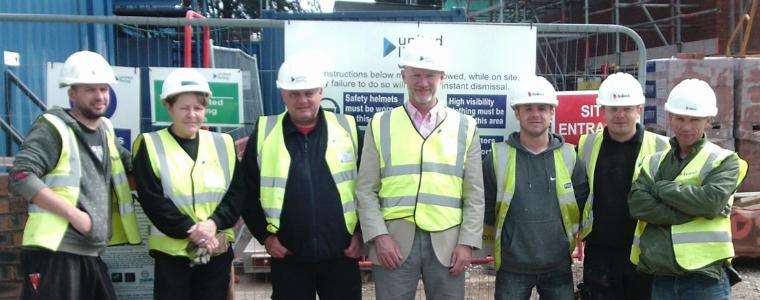Self-build projects can transform lives of homeless veterans, researchers find

A unique self-build project undertaken by homeless former military personnel has the potential to be expanded nationwide, according to experts from the University of the West of England (UWE Bristol).
Academics with expertise in economics, ethnography, health and housing tracked the experience of armed forces veterans as they worked on a scheme to build their own homes on a plot of land in Bristol.
In an evaluation of the project, they concluded the initiative had transformed the lives of those participants who remained with the project until the end by helping improve their relationships, job prospects, mental wellbeing and physical health.
A group of 10 homeless veterans aged 30-55 received on-the-job training and support as they set about building their own homes on a site in York Road in 2015.
The project was spearheaded by the Community Self Build Agency (CSBA) charity in response to a growing awareness of ex-services personnel being found among those sleeping rough. It is estimated 15 per cent of veterans might be homeless for a time when they leave the forces - which includes living temporarily in a B&B or hostel, or 'sofa surfing' as well as sleeping on the street.
Through the self-build scheme, veterans who have struggled to readjust to civilian life after military service received support to build their own homes, find employment and reconnect with their families.
UWE Bristol's evaluation team, led by Senior Research Fellow Anthony Plumridge and funded by the Forces in Mind Trust (FiMT), found the scheme to be cost effective and beneficial to the wider community with every £1 spent yielding up to £7.20 of benefits. The assessment was conducted to measure the effectiveness of the scheme, developed with Knightstone Housing Association. The findings could now be used to help establish the best way of running similar projects in future.
The York Road development of 10 homes was the second self-build project undertaken by veterans organised through the CSBA, with the first scheme in Bristol's West Street completed in 2012. The West Street project also proved successful, with participants gaining employment, reducing alcohol or drug dependency, rebuilding family relationships and extending social networks. Sites in Weston-super-Mare, Plymouth and Wrexham have now been earmarked for similar developments.
The research summarised in the report included in-depth interviews with self-builders conducted by Dr Katherine Collins. The veterans spoke of feeling pride and a sense of achievement, increased confidence and willingness to trust. Some noticed improvements in physical health, attributed to the combination of food provided every day on site, exercise, fresh air and improved sleep. Most participants later found work, using their experience on site, training and contacts made with subcontractors.
One self-builder told researchers: "…it gave [me] my life back. If I didn't go on this project I'd probably still be where I was at, in hostels… and I still think I'd be doing that or jail or in a nut house…"
The report said: "Our analysis showed that participants in the project had a positive effect on the self-builders' relationships, with the majority reconnecting with estranged family. It helped several self-builders to find work, and improved others' prospects through training. It improved their mental wellbeing, and in two cases, their physical health.
"We found that being strongly motivated towards a goal contributed to a self-builder's success, as did the willingness to stick with the project, even during difficult times and delays. The emphasis among the CSBA team of encouraging and enforcing daily attendance on site helped get self-builders into a routine, and the rapport and personal support provided on site contributed to the overall impact.
"Our overall recommendation is that the work of the CSBA with the ex-service personnel should be continued and expanded."
Ray Lock CBE, Chief Executive of FiMT, said: "There are many components that contribute to a successful transition from military to civilian life, and there is clear evidence that most service leavers have the knowledge and resilience to cope with the process. However, and for a variety of reasons, some people struggle, and providing a secure and safe home, together with a framework of skills and employment and the opportunity to reconnect with friends and family, can be the catalyst for positive change.
"Self-building schemes could, it is indicated by this report, act as an enabler for change while delivering considerable benefits. The challenge now is to exploit these findings perhaps more ambitiously to expand the self-build movement across the United Kingdom, so as to reach out and transform the lives of many, many more. The evidence is here – the opportunities await."
More information: Evaluation of the impact of self-help projects in supporting ex-Service personnel: www.fim-trust.org/wp-content/u … E-CSBA-self-help.pdf

















